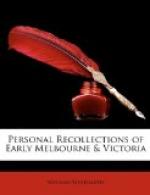This is my old friend, the “Father of Separation” (from New South Wales), with whom I marched for years towards attaining that object. He was a proud man, who, with his vigour of mind and body, grasped his world with a firm hand, and was not, perhaps, of the humour to ask the help or prayers of anyone. But his church, by enjoining the above formula over its dead, had its own way of humbling even the proudest, whether the great or the small, the prince or the peasant. I was surprised to find that one who held so commanding a position in our young community should have been, at death, only 52.
He took the chief charge of the separation movement, if, indeed, it did not originate with him; but, sad to say, he died, at this too early age, just the year before the great object of his later life had been attained. In considering this question practically as a merchant, my view of the determining principle as to the mutual boundary line was that the natural tendency of the trading, whether it took the Sydney or the Melbourne direction, should decide. Thus the hoofs of the bullocks, whether they indicated the northerly or the southerly direction, would decide the contentious question. When I mentioned this point to Curr, who, curiously enough, had wholly omitted it from a very long list of “my reasons for separation,” he saw at once its importance, and, in incorporating it in his list, remarked that it was worth all the rest put together. Whenever we sat together afterwards at a separation meeting, he would pass me the joke about the “hoofs of the bullocks” deciding the boundary. Sir John Robertson has since told us that Melbourne missed its destiny in this fatal separation movement, for, had she remained within New South Wales, she would have been the capital of Eastern Australia. Well, that slap in the face to us is not altogether uncleverly or unfoundedly directed. The eventuality thus predicted for us might, indeed, have happened. And we, too, might have hesitated in our divisive course if we could but have foreseen two things: first, that the very next year Victoria should produce as much as fifteen millions of gold, and for some twenty years after between six and twelve millions yearly; and second, that our mother, Sydney, who had completely the whip-hand over us at the time, would have permitted us to use all our great resources in order to place ourselves, at her expense, the first in the race.
1853.
“The Honourable James Horatio Nelson Cassell, H.M. Commissioner of Customs, Member of the Executive Council of Victoria, born 1814. 39 years of age.” I have already had to mention repeatedly one of my very best and most intimate friends. He died in November, 1853, while I was upon a Home visit. He left a message for me that he looked forward to resuming our most pleasant friendship in Heaven. What a reality of voice has this hope when it comes thus from the brink of the grave! What a strength of resistance to that tendency of modern science, which, as interpreted by some even of its greatest chiefs, is to abolish the hope of the life beyond the grave, and to class us all with “the beasts that perish.”




